Serving 777 students in grades Kindergarten-10, Durham Charter School ranks in the top 50% of all schools in North Carolina for overall test scores (math proficiency is top 50%, and reading proficiency is top 50%).
The percentage of students achieving proficiency in math is 59% (which is higher than the North Carolina state average of 51%). The percentage of students achieving proficiency in reading/language arts is 53% (which is higher than the North Carolina state average of 50%).
The student:teacher ratio of 12:1 is lower than the North Carolina state level of 15:1.
Minority enrollment is 98% of the student body (majority Hispanic), which is higher than the North Carolina state average of 57% (majority Black and Hispanic).
Quick Stats (2025)
- School Type: Charter School
- Grades: Kindergarten-10
- Enrollment: 777 students
- Student:Teacher Ratio: 12:1
- Minority Enrollment: 98%
- Overall Testing Rank: Top 50% in NC
- Math Proficiency: 59% (Top 50%)
- Reading Proficiency: 53% (Top 50%)
- Science Proficiency: 90-94% (Top 5%)
- Source: National Center for Education Statistics (NCES), NC Dept. of Education
Top Rankings
Durham Charter School ranks among the top 20% of public schools in North Carolina for:
Category
Attribute
Most improved public schools
Science Proficiency
Percent Eligible For Free Lunch
Student Attention
School Overview
Durham Charter School's student population of 777 students has grown by 88% over five school years.
The teacher population of 63 teachers has grown by 110% over five school years.
School Type
Grades Offered
Grades Kindergarten-10
Total Students
777 students
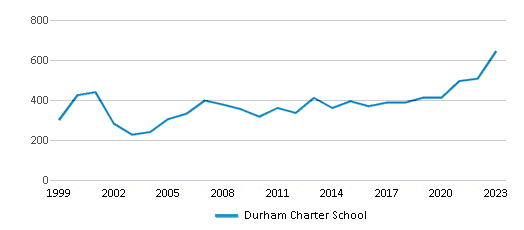
Gender %
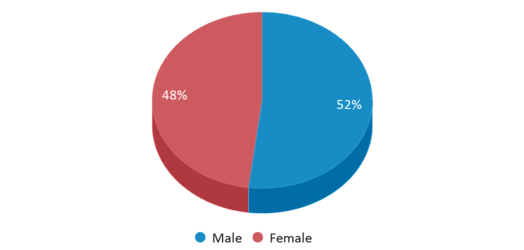
Total Classroom Teachers
63 teachers
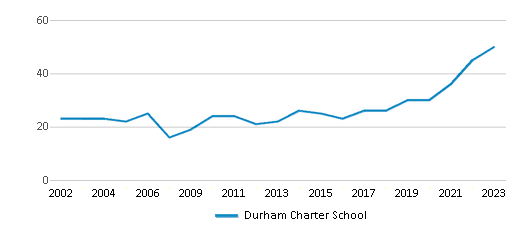
Students by Grade
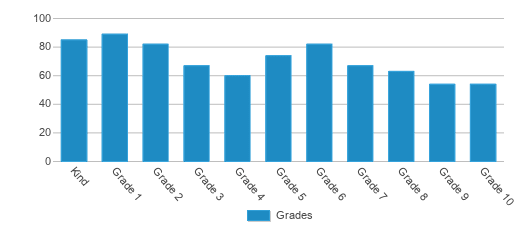
School Rankings
Durham Charter School ranks within the top 50% of all 2,617 schools in North Carolina (based off of combined math and reading proficiency testing data).
The diversity score of Durham Charter School is 0.40, which is less than the diversity score at state average of 0.71. The school's diversity has stayed relatively flat over five school years.
Overall Testing Rank
#921 out of 2617 schools
(Top 50%)
(Top 50%)
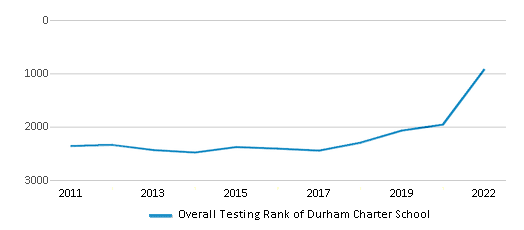
Math Test Scores (% Proficient)
59%
51%
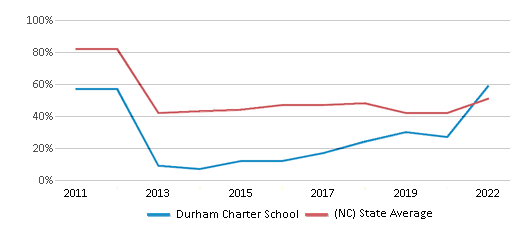
Reading/Language Arts Test Scores (% Proficient)
53%
50%
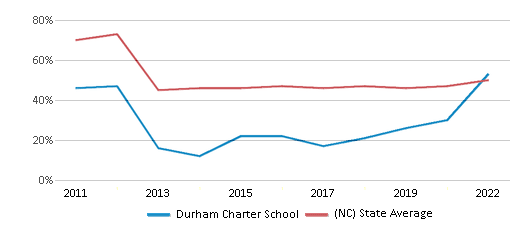
Science Test Scores (% Proficient)
90-94%
63%
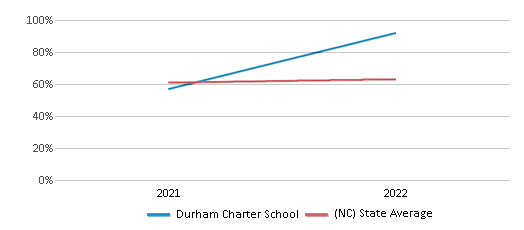
Student : Teacher Ratio
12:1
15:1
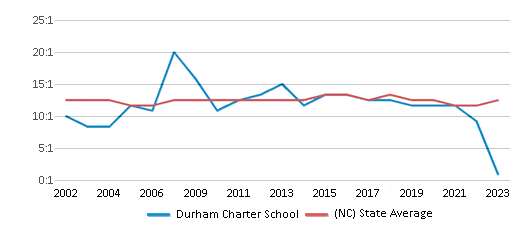
American Indian
n/a
1%
Asian
n/a
4%
Hispanic
75%
21%
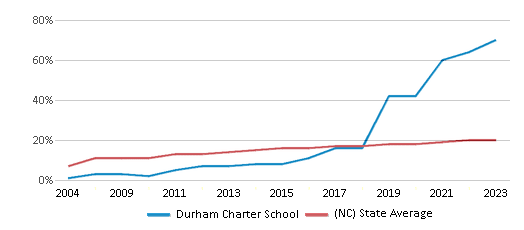
Black
21%
25%
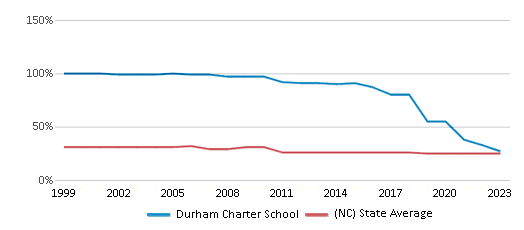
White
2%
43%
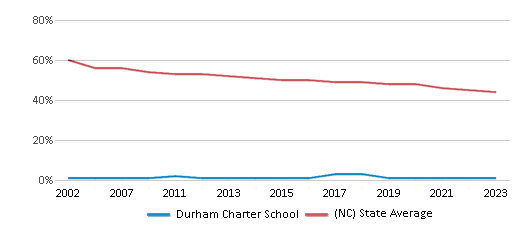
Hawaiian
n/a
n/a
Two or more races
2%
6%
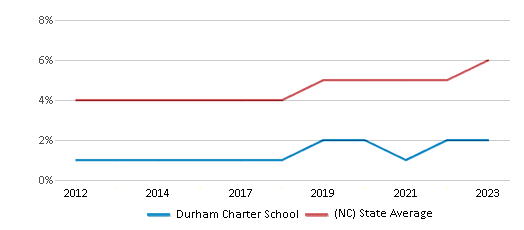
All Ethnic Groups
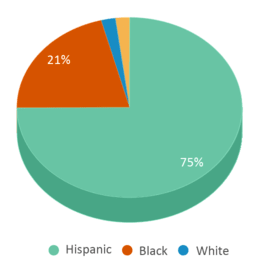
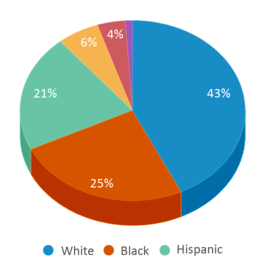
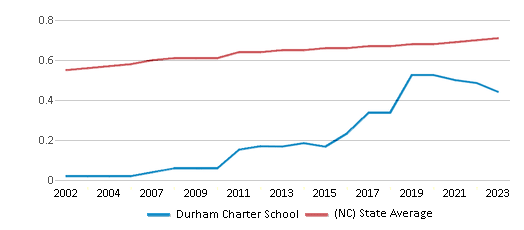
Participates in the National School Lunch Program (NSLP)
Yes
Eligible for Free Lunch
99%
68%
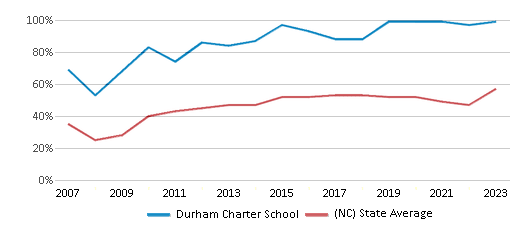
Eligible for Reduced Lunch (13-14)
8%
7%
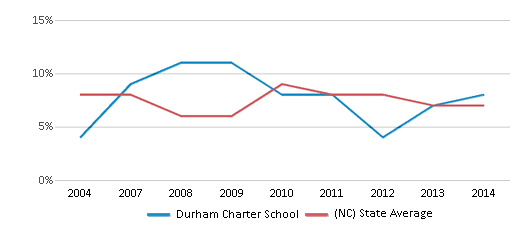
School Statewide Testing
School District Name
Source: National Center for Education Statistics (NCES), NC Dept. of Education
Profile last updated: 02/09/2025
Frequently Asked Questions
What is Durham Charter School's ranking?
Durham Charter School is ranked #921 out of 2,617 schools, which ranks it among the top 50% of public schools in North Carolina.
What schools are Durham Charter School often compared to?
Durham Charter Schoolis often viewed alongside schools like Community School Of Digital & Visual Art by visitors of our site.
What percent of students have achieved state testing proficiency in math and reading?
59% of students have achieved math proficiency (compared to the 51% NC state average), while 53% of students have achieved reading proficiency (compared to the 50% NC state average).
How many students attend Durham Charter School?
777 students attend Durham Charter School.
What is the racial composition of the student body?
75% of Durham Charter School students are Hispanic, 21% of students are Black, 2% of students are White, and 2% of students are Two or more races.
What is the student:teacher ratio of Durham Charter School?
Durham Charter School has a student ration of 12:1, which is lower than the North Carolina state average of 15:1.
What grades does Durham Charter School offer ?
Durham Charter School offers enrollment in grades Kindergarten-10
What school district is Durham Charter School part of?
Durham Charter School is part of Durham Charter School District.
In what neighborhood is Durham Charter School located?
Durham Charter School is located in the Morehead Hill neighborhood of Durham, NC. There are 1 other public schools located in Morehead Hill.
School Reviews
1 3/26/2020
This is the worst school ever. The teachers do too much. They always want the parents to go around the carpool so that they can open the door for the kids, like my child don't help to open the damp door. And besides some of us have work that we are going to and we don't have time to wait around the carpool. The principal needs to step up and act like a man before we vote to fire him out. And the teachers need to learn some manner and treat the parents with respect. Like I've never had a teacher disrespect me like that ever. I'm planning on suing this school unless you change your stupid rules.
5 3/24/2020
My review is basically if your family is at a very low income status. This school will be the perfect school to be part of. I can say this because I am one of the current students of the 2019-2020 PRIDE school year. Am in 6th grade, but I can mostly say that after the last principal went out. The new principal, Mr. Quigley, has made HSA great again. Even the Healthy Star Academy School Pledge it's just an example of how the school has changed. Pledge: As a Healthy Start Scholar, I pledge to myself, my family, my Healthy Start peers, and my community, to be the best that I can be. I will embody the attributes of a PRIDE scholar. I will respect myself and all people as I honor and celebrate our differences. I will be accountable for all my actions. I will treat others with empathy and kindness. I will work to persevere when times are difficult, and I will be ambitious, and take advantage of new opportunities. I pledge to be my best self always. Together our community will change the world.
5 3/19/2020
Best school ever teaches you a lot of things and helps with work and reward you when you do good like filde trips end-of-year trips and they have the best teachers ever that help you with problems and class work and homework and if you need time to get back on tract or talk to them about problems that you have.
5 5/21/2016
We like and recommend this school. We have really appreciated the dedicated teachers. The Administration and faculty encourage all students, including those who have very little support at home. There are some poorly behaved students and parents; however, we've been impressed with the school's response to them, and the school is very safe. We like the small family atmosphere, too.
2 4/18/2011
This is hands-down the worst school I have ever seen. The students are not held accountable for actions like fighting, cheating, or skipping, and they learn they can get away with it. There are cameras in the classrooms, more for the principal to watch the teachers than the students (if you don't trust your teachers why did you hire them?). There is a complete lack of communication between the principal and staff. Bottom line- I would only send my kids there if I were training them to be criminals, not if I wanted them to get a decent education.
Review Durham Charter School. Reviews should be a few sentences in length. Please include any comments on:
- Quality of academic programs, teachers, and facilities
- Availability of music, art, sports and other extracurricular activities
Recent Articles

What Is A Charter School?
Explore the world of charter schools in this comprehensive guide. Learn about their history, how they operate, and the pros and cons of this educational innovation. Discover key facts about charter schools, including admission policies, demographics, and funding, as well as what to look for when considering a charter school for your child.

10 Reasons Why High School Sports Benefit Students
Discover the 10 compelling reasons why high school sports are beneficial for students. This comprehensive article explores how athletics enhance academic performance, foster personal growth, and develop crucial life skills. From improved fitness and time management to leadership development and community representation, learn why participating in high school sports can be a game-changer for students' overall success and well-being.

February 05, 2025
Understanding the U.S. Department of Education: Structure, Impact, and EvolutionWe explore how the Department of Education shapes American education, from its cabinet-level leadership to its impact on millions of students, written for general audiences seeking clarity on this vital institution.









